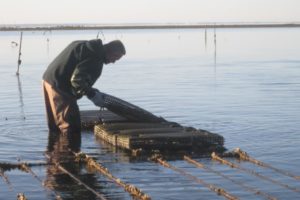 CHATHAM – Chris Schillaci looked out at a sea of mostly plaid shirts, stuffed behind rows of cafeteria-style tables, who had come together after a day outside.
CHATHAM – Chris Schillaci looked out at a sea of mostly plaid shirts, stuffed behind rows of cafeteria-style tables, who had come together after a day outside.
“You can make a living and stay on the Cape with an acre oyster grant,” the aquaculture specialist for the Massachusetts Division of Marine Fisheries said.
The crowd of primarily oyster farmers looked back.
“Ok, maybe two acres,” he said with a smile.
Schillaci was speaking at an Ocean Farming Forum sponsored by SCORE of Cape Cod and the Islands, and the local office of the United States Department of Agriculture.
The idea? Bring farmers together to learn from one another and improve the industry. Much of the discussion revolved around the future of offshore shellfish and kelp farming, in deeper waters than most of the Cape’s traditional nearshore shellfish grants.
“Commercial fishing is a rapidly evolving business and Massachusetts has been a leader through old-fashioned Yankee ingenuity and an uncanny ability to adapt to a changing world,” said Melissa Sanderson of the Cape Cod Commercial Fishermen’s Alliance, which co-hosted the event. “To stay at the forefront and grow small businesses and protect the ecosystem we all rely on, it’s vital to support current and new growers with technical, business, education and networking opportunities.”
Scott Lindell, of Woods Hole Oceanic Institution, says the success and growth of the industry is critical to something as profound as the survival of the human race.
He told the full house gathered in the conference room of the Cape and Islands Association of Realtors last month the world will have 10 billion mouths to feed by 2050. Lindell said studies have shown that if cows are going to provide the bulk of that protein, the earth needs another land mass the size of South America. That is obviously not in the cards.
“Marine farming holds tremendous potential to unlock food security,” Lindell said.
Still, the future is tricky.
Lindell was able to secure permits for the first commercial aquaculture lease in federal waters off the East Coast in 2014. But for a variety of reasons that lease has not yet been used. He recently consulted for aquaculture developments in Haiti and Morocco.
Closer to home, a companies in Maine are lobbying for larger and larger farms, some up to 100-acre farm, but are facing hard pushback from those who voice environmental concerns and say it is akin to industrialization of the ocean.
Although there is increasing interest and investment in ocean farming and aquaculture, Scott Soares, a former Secretary of Agriculture in our state and a consultant specializing in the nexus of government affairs and fisheries, said other than farmer ingenuity not much has changed in 20 years. The footprint for Massachusetts aquaculture when he started was about 1300 acres; now it is about the same. The reasons range from permitting, economics, infrastructure, and the famous NIMBY mentality – Not In My Back Yard.
“Perhaps with the exception of shellfish, we have yet to find an aquatic Holstein,” he said, referring to an aquaculture production success story like the famous cow.
Soares isn’t touting huge farms; small farms can band together and supply bigger markets. He believes access to bigger markets is on the horizon and products harvested from “open” waters in Massachusetts will be allowed to be shipped into any European Union country.
He sees farmers aggregating oysters and selling them overseas under a broad moniker, such as Cape Cod oysters. He also thinks that success would mean diversifying and selling different oyster products.
“Look at the range of tuna products,” he said. “Though they may be different species, you can buy a can that is 79 cents or sashimi that is $200 a pound, even if it is the same fish.”
He said places like the port of New Bedford could be a modern cannery row by taking advantage of the infrastructure and experience accessing global markets.
A partnership involving the Fishermen’s Alliance, Woods Hole SeaGrant and Wellfleet SPAT looked at ways to get past market hurdles that impede the advancement of two native shellfish species, surf clams and blood clams, as well as exploring how to expand the market for oysters beyond the “half shell.” The study is part of an ongoing project funded by NOAA Sea Grant called, “Market Development to Diversify Shellfish Aquaculture Products in Massachusetts.”
Shipping oysters around the world is not a new concept. In the late 1880s Wellfleet had a thriving business called Sealshipt, with a state-of-the art (at the time) facility where the oysters were shucked, sealed in a specially designed container (up to 150 barrels a day) and shipped by locomotive and packet ship to such far-flung locales as Canada and Cuba, according to David Wright’s book “The Famous Beds of Wellfleet.”
Like then, oysters are still shucked by hand and very labor intensive, so the study found that labor costs may be a problem. Still, with a large number of oysters not pretty enough to present on a raw bar, problems over-wintering large oysters, price fluctuations, and the growing use of oysters to filter nitrogen and improve water quality, expanding market opportunities may make increasing sense.
The state’s aquaculture farmers are geared to a boutique raw bar market, and it’s paid off. The total Massachusetts acreage may not have changed but the value of shellfish has, jumping from $4-6 million a decade or so ago to close to $30 million now. The value of the oyster harvest in Maine is only around $6 million.
But opportunity for growth remains because many grants aren’t being farmed to their full potential.
“We could double our output without adding acreage,” Schillaci said — “not that I am saying we don’t want more acreage,” he hastened to add.
By DOREEN LEGGETT, Cape Cod Commercial Fishermen’s Alliance
























